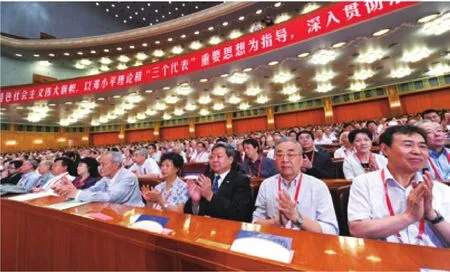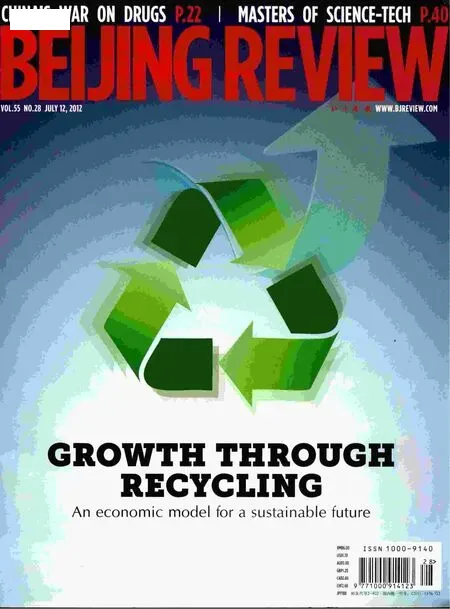Engineering China’s Science
Chinese scientists help shape national policies By Tang Yuankai
Engineering China’s Science
Chinese scientists help shape national policies By Tang Yuankai
China’s best and brightest are set to take on some of the country’s most important policies in science and technology. But a recent dispute over a new member’s controversial background shows that even the stuffy environment of academics can be rattled by gossip and intrigue.
Top Chinese scientists met to discuss the country’s scientific goals in Beijing from June 11 to 15 at a biennial conference, in the biggest gathering of experts from the fields of science and engineering in China.
More than 1,200 academicians attended the conference, composed of the 16th General Assembly of the Members of the Chinese Academy of Sciences (CAS) and 11th General Assembly of the Members of the Chinese Academy of Engineering (CAE). Since 1997, the CAS and the CAE have jointly carried out the biennial meeting.
The academicians do research and provide consultations on major global challenges. Many of their suggestions have been adopted by the Central Government. The conference helps promote a more balanced and democratic decisionmaking process in shaping national policies, said Zhu Daoben, a famous Chinese chemist and one of the leaders of all academicians.
Sparking debate
This year’s conference was overshadowed by arguments concerning the integrity of the current academician system’s recruitment standards.
Attendees debated whether a CAE academician named Xie Jianping, whose recent entry into the group stirred controversy due to his ties with the tobacco industry, would participate in the gathering. Xie never showed up, but the debate never ceased.
Xie is vice president of Zhengzhou Tobacco Research Institute of China National Tobacco Corp. When his name appeared on the list of newly elected academicians by the CAE on December 8, 2011, he and the recruitment committee were widely criticized online.
Known as the “tobacco academician” by netizens, Xie’s research in reducing the tar content of cigarettes came under fire, as critics accused him of promoting tobacco sales and encouraging more people to smoke.
In addition to the online opposition, more than 20 CAE academicians of health care condemned Xie’s research as misleading, and close to 100 wrote a letter asking the CAE to review his qualifications.
The CAE turned down the appeals by explaining that Xie did not violate any rules or regulations and that the procedure of Xie’s admission is in line with CAE standards. However, CAE academician Zhong Nanshan said if the admission procedures are against the welfare of the people, then they must be revised.
CAE and CAS have undoubtedly recognized the pitfalls in its system.
“To improve the recruitment system is an important aspect of the country’s middle and long-term talent planning,” said Bai Chunli, President of CAS, at the conference in Beijing,“This job will be led by CAS, and completed jointly with CAE, the Ministry of Education and the Ministry of Science and Technology.”

PARTICIPANTS: Chinese academicians in science, technology and engineering attend the conference at the Great Hall of the People in Beijing on June 11, 2012
“In 2012 we will complete a special report concerning the recruitment system, and submit them to the government for scrutiny,”Bai added.
International support
It was great that Chinese scientists could participate in the country’s national strategic information consulting, and join in the long-term planning of the country’s scientific and technological development through research subjects, said Colin Blakemore, a professor of neuroscience at the University of Oxford, a member of the Royal Society of the United Kingdom, and also a foreign academician of CAE. Meanwhile, he added, government officials often consulted the academicians while making policies.
Blakemore’s opinion was echoed by Alfred Y. Cho, another foreign academician of CAS. Cho was also president of Semiconductor Research Laboratory of Bell Labs. Inviting scientists to provide consultation in the work of government is conducive to the country’s scientific and technological development, said Cho.
“We will always need the suggestions and support of foreign academicians on our march to a higher level,” said Bai.
Norman N. Li, a foreign academician of CAS and academician of the United States’National Academy of Engineering, attended a meeting in Washington, D.C. just before coming to Beijing.
When his peers at the meeting heard Li was going to China for the biennial conference, they expressed willingness to strengthen cooperation with China, said Li. He said he is willing to build a bridge of communication between China and the United States.
Li was not the only person willing to complete that mission. “China’s and Japan’s research have their own advantages. They can complement each other,” said Ryoji Noyori, a newly elected foreign academician of CAS and a Nobel Prize winner. “Cooperation between peoples of different cultural backgrounds can promote the development of science and technology in the world,” he added.
Noyori expressed gratitude for the support of his Chinese colleagues in his research career.
Science of reform
Reforming the scientific and technological system was also a major priority at the conference.
The Central Committee of the Communist Party of China has been drawing up the Draft on Deepening China’s Scientific and Technological System Reform and Accelerating the Building of the Innovation System, said Hu Jintao, President of China, in a keynote speech at the biennial conference.
In recent years, the country’s investment in scientific research had been increasing rapidly, but real progress is yet to be made due to flaws in the status quo, said Xia Jianbai, an academician of the Institute of Semiconductors at CAS.
“Thirty years ago, what we did were mainly follow-up studies, but now we already have the ability to make innovations,” said Chu Junhao, a CAS academician and expert on semiconductor devices. “We have enough experts, equipment and capital for innovation. But the existing research system has impeded this process. Reform should be carried out as soon as possible.”
Many academicians agree that the allocation of scientific and technological resources has been too dispersed, repetitive and administration-oriented. This has restrained the advancement of China’s innovative ability.
They stress that it is essential to first get a comprehensive understanding of the rules of innovation, and then master the advantages and disadvantages of the current scientific and technological system. Only then can China develop a system which is more in accord with the rules of scientific progress, more beneficial to talent cultivation and innovative scientific research, and capable of bringing long-term benefits to the country’s sustainable development.
During the conference in the afternoon of June 11, Chinese Premier Wen Jiabao gave a speech to the academicians, discussing the prospects for reform.
Wen urged the academicians to attach more importance to company innovations. The key to reform, he said, is to establish a technological innovation system with the businesses as a mainstay.
Companies should not only become a major force in transforming scientific and technological results into industrial products, but also become the major party of technological research and innovation, said Wen.

